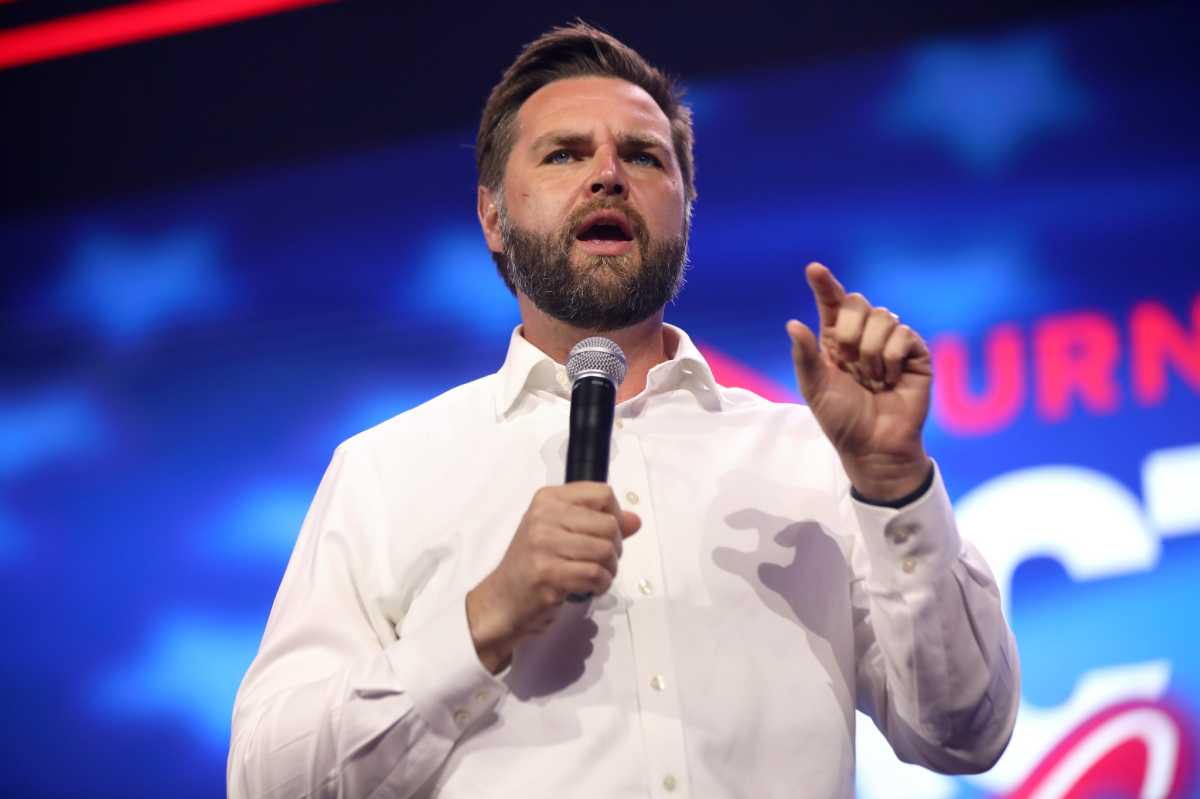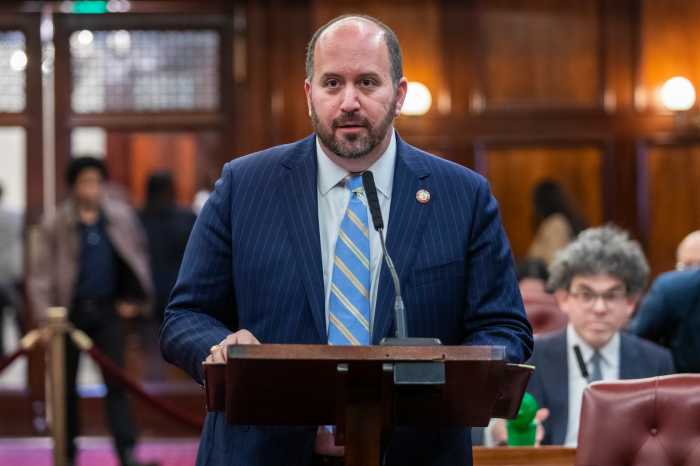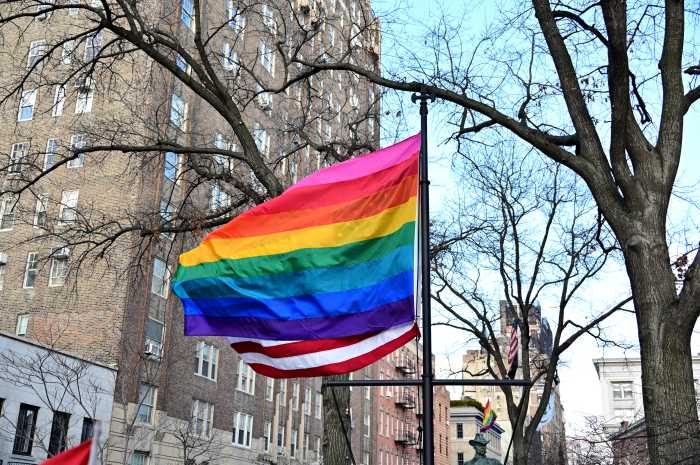Speaking at a fundraiser for a right-wing group, Senator JD Vance recalled that he has known Ralph Reed, the founder of the Faith & Freedom Coalition, since first running for his Ohio Senate seat in 2022.
“We’re both people of faith who care a lot about insuring that our country lives according to the common good,” Vance said during the Sept. 16 event. “We don’t want to force our faith on anybody. What we want is to recognize and to have motivate us the faith that is, I think, the source of all great truth in human history and especially this country. We want our public policy to be motivated by the wisdom of loving thy neighbor.”
He mentioned the common good a second time during his roughly 30-minute speech. While that phrase is used in many speeches, in the names of organizations, and other contexts, it has a particular meaning for Vance, who converted to Roman Catholicism in 2019.
For some right-wing Catholics, including one who politico.com identified as among the “New Right Thinkers” who are part of Vance’s inner circle, the common good refers to an ideology that argues that liberal democracy has failed western societies and should be replaced by a mixed constitution that would likely include a significant role in government for the Roman Catholic Church in ruling those societies. Their version of the common good appears to exclude members of the LGBTQ community and argues that the LGBTQ community has contributed to the failure of those societies.
Patrick Deneen, a professor of political science at Notre Dame and one of the people identified by Politico as part of Vance’s inner circle, published “Why Liberalism Failed” in 2018 in which he defined liberalism not as a position on a left-wing to right-wing scale, but as an ideology that privileged individual rights and economic progress over the flourishing of a people in a society. He asserted that both the right and the left in western societies had long embraced liberalism to the detriment of those societies because it allowed the unrestrained pursuit of individual rights and unlimited economic expansion that has harmed a large portion of those societies.
To an extent, Deneen’s critique mirrors those on the left when they attack neoliberalism, though his focus is less on economics and more on the social impact of liberalism. He discusses unions favorably and is most concerned with America’s working class seeing this nation as divided between the many and an elite that have inordinate influence. But he also sees “unfettered immigration to transgenderism” as among the “many discontents” that are disturbing Americans.
In his 2023 book, “Regime Change: Toward a Postliberal Future,” Deneen appears to be attacking liberals and liberalism, his earlier target. He reiterates the positions he articulated in “Why Liberalism Failed,” and complains that the 2015 dispute over Indiana’s Religious Freedom Restoration Act, which allowed discrimination against LGBTQ people by virtually any entity, as being unfair. A second controversy erupted that year when the daughter of pizzeria owner said they would not cater a same-sex wedding.
“In both cases, the power elite demonstrated that the ‘traditional values’ of the working-class electorate were to be destroyed,” Deneen wrote.
Later in the book, Deneen writes of liberalism, “Its underlying assumption is that there is no objective ‘Good’ to which humans can agree in any time and in any place, so the only defensible political form is one in which every individual pursues his, her, or xir’s idea of individual good, and the global cosmopolitan order ensures the backdrop of sufficient peace and prosperity leaving everyone largely undisturbed.”
In an email, Deneen declined an interview request and did not respond to questions asking if the 2015 US Supreme Court decision requiring states to issue marriage licenses to same sex couples, the 2020 US Supreme Court decision that barred employment discrimination on the basis of sexual orientation or gender identity, and the 2003 US Supreme Court decision that struck down sodomy laws across the nation should be overturned.
“If I do not discuss in my publications any of the topics you’ve asked about, it’s warranted to conclude that I have no developed scholarly view on the matter,” Deneen wrote in a brief email.
Adrian Vermeule, who is another proponent of this approach to government, has been clear about his opposition to the 2015 decision and the 2020 decision though he did not respond to an email asking if they and the 2003 decision should be overturned.
In his 2022 book, “Common Good Constitutionalism: Recovering the Classical Legal Tradition,” Vermeule, a professor at Harvard law school, argues that the 2015 and 2020 decisions were wrongly decided. Like Deneen, he argues with both the right and the left. The right’s application of originalism, the view that a law should be interpreted in accord with its original understanding, is an “illusion.” His position against originalism has been harshly criticized by some on the right. He asserts that courts should be free to legislate morality.
In 2022, Vance, Deneen, and Vermeule attended a two-day conference at Franciscan University in Ohio titled “Restoring a Nation: The Common Good in the American Tradition.”
A branch of this movement – the integralists – is distinguished by its extreme views. In a number of articles, Deneen and Vermeule have been described as integralists, though more recently they are referred to as postliberal. Neither responded to a question asking if there is a difference, but Deneen wrote “I have not anywhere written about integralism, and have not in fact familiarized myself with that school of thought.”
Thomas Crean, a Dominican friar, and Alan Fimister, a theology professor at the Holy Apostles College & Seminary, authored the 2020 book “Integralism: A Manual of Political Philosophy” in which they assert that it is the Roman Catholic Church that should be the head of government. The authors, who also refer to the common good, argue that hereditary slavery can be legally allowed under some circumstances and that women may work outside the home only with their husband’s permission. The unbaptized, meaning Muslims, Jews, atheists, Hindus, all Protestants, and any other non-Catholic religion cannot be citizens or vote. Only Catholics may hold elected office and judicial positions in their scheme.
Some early reviews of the book said that Crean and Fimister included a footnote that “implies (with a reference to an obscure Latin text) that the execution of some LGBTQ people may promote the salvation of souls,” according to one review in Commonweal magazine. (I read the paperback and it appears that that footnote was removed.) Neither author responded to an email seeking comment.
Whether Vance is even aware of, let alone in agreement with this branch of the conservative Roman Catholic Church, is unknown. The Trump campaign did not respond to an email seeking comment.
This movement could benefit from its relationship with Vance, who might become America’s next vice president or eventually president given that Donald Trump is 78. Additionally, six of the nine justices on the US Supreme Court are Roman Catholics. But some recent press reports have described the postliberal movement as failed.
In a 2023 review of Kevin Vallier’s book, “All the Kingdoms of the World: On Radical Religious Alternatives to Liberalism,” in the National Catholic Reporter, Michael Sean Winters describes integralism as “insanity,” saying that “the whole topic of integralism is bonkers,” and “integralism is the latest iteration of right-wing zaniness in Catholic circles.” But he concludes by saying “The fact that they command a following is frightening and requires everyone to learn more about the movement and why it is so dangerous.”





































